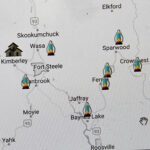Home »

Barrier to First Nation land registration eliminated
First Nations can now acquire, hold and register land, such as fee simple land, leaseholds and other interests in their own names directly, just as individuals, Modern Treaty Nations and corporations already could.
Changes to the Property Law Act and the Land Title Act introduced and passed last month through Bill 13 – The Land Title and Property Amendment Act, 2024, are in effect May 21, 2024. The changes eliminate a discriminatory and racist legal barrier that added time and cost to First Nations land registration with the B.C. land title office. First Nations will be able to register their fee simple land interests, as well as other applicable land interests, in the land title office accordingly.
The changes have no impact on non-First Nation landowners. They remove the need for First Nations recognized as legal entities under federal law (e.g., Indian Act bands) to use proxies, such as development corporations or societies to purchase, hold and register land. First Nations may choose to acquire, hold and dispose of fee simple land under a corporation or proxy, or may choose to hold fee simple land in the name of the First Nation.
Changes to regulations under the Land Owner Transparency Act support the implementation of Bill 13 to make it easier for First Nations to register land in the land title office. First Nations’ treatment through the Land Owner Transparency Act will align with how the Province is treated. A First Nation governing body will be exempt when registering an interest in land under their own name. This exemption does not apply to individuals or non-government organizations, a Ministry of Indigenous Relations and Reconciliation and Ministry of Finance media release explained.
“A connection with land is central to the identity of many First Nations. Ensuring that First Nations have the same opportunity to hold fee simple land directly represents an important step forward on the path to reconciliation. These changes ensure fairness by reducing barriers and costs that First Nations have faced when holding fee simple land,” the release stated.
The changes support the province’s commitments to reconciliation by advancing the Declaration Act Action Plan commitment 4.25, the Truth and Reconciliation Commission Call to Action No. 45, and United Nations Declaration on the Rights of Indigenous Peoples articles 3, 4, 5, and 26 (2).
e-KNOW file photo







